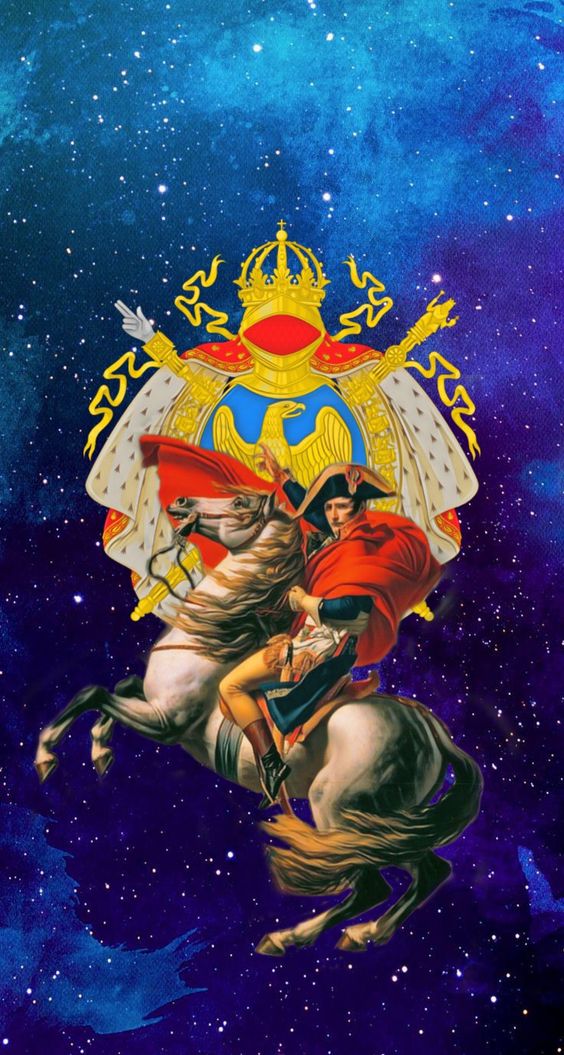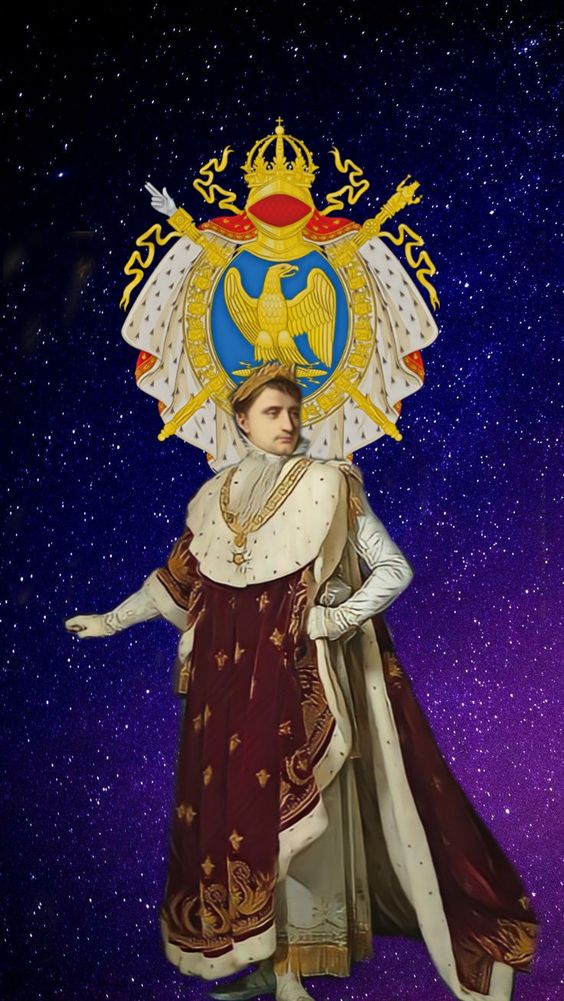
The Eternal Napoleon永恒的拿破仑
“As far as I am concerned,” Napoleon wrote in 1801, “there is no immortality but the memory that is left in the minds of men.” If his purpose had been to achieve such immortality–and everything about his career suggests nothing less–then he succeeded to a degree beyond any figure in modern history. So fearful was the British government of his continuing influence over the affairs of Europe that despite his wish to be buried “on the banks of the Seine, amidst the French people whom I loved so well,” his remains were not allowed to leave St. Helena. Instead, he was buried beside a stand of willows at one his favorite spots on the island, a place known as Torbett’s Spring. In the end, however, he was to have the final say, for memories of the horrors of war were soon mitigated by the realities of Louis XVIII’s reactionary regime, and amid a general nostalgia for the grandeur of the past, Napoleon would become the center of a growing cult. By 1840 his hold on the French imagination was such that King Louis Philippe–partly seeking to bolster the popularity of his own pedestrian regime–sent an expedition to St. Helena to bring the emperor’s remains back to France. In Paris, large crowds flooded the streets to witness their ceremonial return, and as surviving veterans of the Old Guard led the procession down the broad expanse of the Champs Elysees, cries of “Vive l’Empereur!” rang out once again, 25 years after the end of Napoleon’s reign. Truly, the Emperor lived on. Napoleon’s legend would continue to haunt French politics for the rest of the century, playing a part in the Revolution of 1848 by which his nephew, Louis Napoleon (later Napoleon III), would eventually come to power. Ultimately, of course, his influence would reach far beyond French politics, becoming a source of intense historical and psychological interest. Perhaps no figure in history has ever become as thoroughly identified with his times as Napoleon, and very few have ever inspired such a vast body of histories, biographies, memoirs, novels, and published works of all kinds. As might be expected, his own account, published in 1823, is full of justifications for his actions and condemnations of his enemies and critics. The way he saw it, as a champion of the French people he had been forced to wage endless wars in response to the persistent treachery of the monarchist oppressors of Europe, and far from controlling events, he had been controlled by them. Many historians were to take a different view, of course, and thus the controversy that had surrounded him in life would continue unabated long after his death. In the end, the profile that emerges remains mixed at best, many tending to view his career as a cautionary tale on the evils of absolute power. And yet, the opinions of historians must be weighed against those of generations of admirers for whom the era is of more than academic interest. In Paris, where the Corsican trainee witnessed first-hand the turmoil of revolution and rode its conflicting currents to the heights of political and military power, the cult of Napoleon is still in evidence, most prominently at the former veteran’s hospital known as L’Hotel des Invalides. A masterpiece of seventeenth-century architectural splendor at the center of the city, the Invalides is well known as the site of Napoleon’s Tomb, a massive marble crypt that attracts many thousands of visitors each year. Upstairs, several floors of the vast Musée de l’Armée are devoted to the period, and on the streets of the city monuments and place names recalling the era abound–much more so than those dedicated to the Republic or the Revolution itself, public remembrances of which tend to be few and far between. For all of the destruction and loss of life wrought by its many wars, the age of Napoleon is remembered for something beyond the reach of historical analysis, beyond even the compulsions of national honor. Known simply as La Gloire–Glory–it was a sentiment first experienced by newly recruited citizen-soldiers on a hillside at Valmy in 1792. In the years that followed, Napoleon would become its chief architect as well as its living embodiment, his name and image becoming synonymous with a larger Romantic age whose artistic and emotional heritage are still with us. The fact that so many of his contemporaries followed him in its pursuit is no mystery of a bygone era. Its ongoing appeal for people of all nationalities is still to be seen in the faces of the crowds at Les Invalides and wherever his story is told.
永远纪念拿破仑In memory of Napoleon forever
拿破仑是一名出色的军事家,他一生亲自参加的战役达到60多个,而其指挥的多个战役,直到今天在军事史上依然有重要意义。但是他的征战打破了欧洲的权力均衡,导致其他欧洲强权7次组成反法同盟,最终彻底击败拿破仑。在拿破仑战败后的维也纳会议上,新的欧洲秩序与均衡被很快重新建立起来。 拿破仑的影响还体现在《拿破仑法典》,这部法典是很多现代民主国家法律体系的原型。 政治上,拿破仑始终尽可能的保持平等的原则,一个统治者,是不愿意制定反对自己的法律的。《拿破仑法典》充分体现了他的政治思想。他深受卢梭的影响,无论是他的法律,还是他的统治方式,都可以看到“社会契约”的影子。 他对后世的影响是深远的,他之所以受到法国人民的爱戴,并不是只是因为他打了很多胜仗,给法国人带来了荣誉,因为这些毕竟是以失败告终的。但是他留下的公路系统,为农民争夺的土地,等等,从公众建设到政治制度,才是对法国的真正影响所在。 大革命初期提出的自由平等博爱的原则,拿破仑至少贯彻了第二和第三条。至于自由,这的确是值得非议的。但是有的做法,不能不说是历史的必然。他的独裁统治避免了无政府主义,但又不是王朝复辟似的独裁。因此可以说,在名义上他是皇帝,在野心上他是恺撒,但是实际行动上,他已经努力接近了很多今天的共和制国家都还在努力实现的理想。 除此之外,拿破仑也是最早提出欧罗巴合众国构想并试图通过武力来实现的人。虽然他本人并未成功实现这个梦想,今天的欧洲正在朝向一体化的目标迈进。 拿破仑为法国带来了荣耀,法国人民始终爱戴这位法兰西战士(有趣的是,他在18岁以前始终认为法国不是他的祖国),1840年12月他的遗体运抵巴黎后,90万巴黎市民冒著严寒迎接他。而在多年后,拿破仑也赢得了对手的尊敬。1855年英国维多利亚女王携王储(即后来的爱德华七世)到老残军人院,女王让王子“在伟大的拿破仑墓前下跪”。
"拿破仑在1801年写道:"就我而言,没有不朽,只有留在人们心中的记忆"。如果他的目的是为了实现这种不朽--关于他的职业生涯的一切都表明,他的成功程度超过了现代史上的任何人物。英国政府如此担心他对欧洲事务的持续影响,以至于尽管他希望被埋葬在 "塞纳河畔,在我深爱的法国人民中间",他的遗体仍不被允许离开圣赫勒拿岛。相反,他被埋葬在他在岛上最喜欢的一个地方的柳树旁,这个地方被称为托贝特之泉。 然而,最终,他拥有最后的发言权,因为对战争恐怖的记忆很快就被路易十八的反动政权的现实所淡化,在对过去宏伟的普遍怀念中,拿破仑将成为越来越多的崇拜者的中心。到1840年,拿破仑在法国人心目中的地位非常高,以至于路易-菲利普国王--部分是为了提高他自己的步行者政权的知名度--派遣一支探险队前往圣赫勒拿岛,将皇帝的遗体带回法国。在巴黎,大量的人群涌上街头,见证他们的回归仪式,当幸存的老兵带领着队伍走过香榭丽舍大街的宽阔地带时,"皇帝万岁!"的呼声在拿破仑统治结束25年后再一次响起。真的,皇帝永垂不朽。 拿破仑的传奇故事将在本世纪余下的时间里继续困扰着法国政治,在1848年的革命中发挥了作用,他的侄子路易-拿破仑(后来的拿破仑三世)最终上台。当然,最终,他的影响将远远超出法国政治,成为强烈的历史和心理兴趣的来源。也许历史上没有任何一个人物像拿破仑那样与他的时代产生了彻底的认同感,也很少有人能激发出如此庞大的历史、传记、回忆录、小说和各类出版作品。正如可以预料的那样,他在1823年发表的自己的叙述中充满了对其行为的辩解和对其敌人和批评者的谴责。在他看来,作为法国人民的捍卫者,他被迫发动无休止的战争,以应对欧洲君主主义压迫者的持续背叛,他不仅没有控制事件,反而被他们控制。当然,许多历史学家持不同看法,因此在他生前围绕他的争议在他死后还会持续很长时间。最后,出现的概况充其量也是好坏参半,许多人倾向于将他的职业生涯视为一个关于绝对权力的罪恶的警示故事。 然而,历史学家的意见必须与几代崇拜者的意见进行权衡,对他们来说,这个时代不仅仅是学术上的兴趣。在巴黎,这位科西嘉受训者亲眼目睹了革命的动荡,并乘着冲突的潮流登上了政治和军事权力的高峰,对拿破仑的崇拜仍然存在,最突出的是被称为荣军院的前老兵医院。荣军院是位于城市中心的十七世纪的建筑杰作,因拿破仑的坟墓而闻名,这个巨大的大理石墓室每年都吸引着成千上万的游客。楼上,巨大的军事博物馆的几层楼都是关于这个时期的,在城市的街道上,纪念这个时代的纪念碑和地名比那些致力于共和国或革命本身的纪念碑和地名要多得多,公众对它们的纪念往往很少。尽管拿破仑时代的许多战争造成了破坏和生命损失,但人们对它的记忆却超越了历史分析的范围,甚至超越了国家荣誉的强制力。它被简单地称为La Gloire--荣耀--这是1792年在瓦尔米的一个山坡上新招募的公民士兵首次体验到的一种情感。在随后的岁月里,拿破仑将成为它的首席设计师,也是它的生动体现,他的名字和形象成为更大的浪漫主义时代的同义词,其艺术和情感遗产仍然与我们同在。他的许多同时代人追随他追求浪漫的事实,并不是一个过去时代的神秘之处。在荣军院和任何讲述他的故事的地方,从人群的脸上仍然可以看到他对所有国籍的人的持续吸引力。
